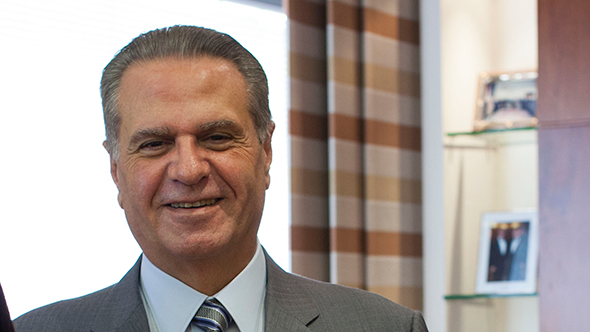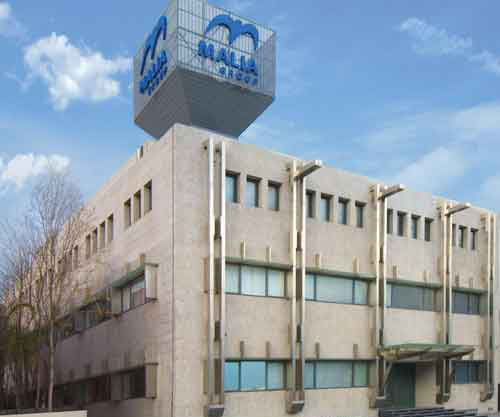Malia Group Believes Diversification in Business is a Strength
Starting as a pharmacy in Northern Lebanon in 1936, Malia Group now consists of 22 legal entities in locations all around the region. The company is involved in several different sectors, including the pharmacetical, cosmestic, and fashion & design sectors, among many others.
Interview with Jacques Sarraf, Chairman of Malia Group

Can you tell us a bit about the history of Malia Group?
The group dates back to 1936. Malia Group started as a pharmacy in Tripoli, Northern Lebanon. Today we consist of 22 legal entities in locations such as Tripoli, Beirut, Damascus, Bagdad, Erbil, Algeria and very soon, we shall be in Dubai.
Since 2003, our expansion plan was based around a one-hour flight from Beirut. Therefore, this covers Egypt, Syria, Lebanon, Iraq, Jordan etc. We then extended that to a two-hour flight from Beirut and now we are expanding to three-hour flights, which will include Dubai. From Dubai, we will be able to serve most of the Gulf countries and we shall also expand into Africa. We are currently discussing the potential pharmaceutical projects in Africa. We are already present in Algeria with technological projects and we are now discussing cosmetic and pharmaceutical projects in Angola.
You have been a very successful CEO running a very diverse company. What advice would you give to young Lebanese CEOs who are up and coming?
Diversification is a strength, both in terms of territory and sector. Previously at business school, we were told to concentrate on focusing a business and we were taught that the strength of a business was its focus. Today, I believe that with what is happening in this area geopolitically, selecting niche sectors and territories can give you added value. It is not necessarily about being in one sector in various territories but rather about being in many sectors in many territories depending on the demand. For instance, we have expanded our business in hospitality in Iraq. We decided not to expand our industry sector in Iraq, as we wanted to leave that to Lebanon only. When it comes to pharmaceutics, cosmetics, and the water industry, these are the added value industries that can be expanded outside of Beirut to serve those markets or the export markets internationally. We have decided to expand into Africa, particularly central Africa, but our expansion will depend on transport costs. In other territories, we choose the sectors that have added value there. For instance, there is an important fashion business in Beirut and the next best location to expand into would be Dubai.
Thus, your advice is not to limit yourself to one sector but to dabble into various areas.
For political reasons, I believe it is better to diversify by sector and by territory. Look at what is happening in Syria; we have been on hold there for three years. Look also, at what is happening in Iraq or Kurdistan. We have been present in Bagdad since 2003 and we have spread our business throughout the country. When we moved into Kurdistan, we entered different sectors such as hotels, logistics, border services etc. that we had not implemented throughout Iraq. In Lebanon, we had been focusing almost exclusively on industry. The pharmaceutical industry is an industry that offers a lot of added value for the Arab countries but also it requires a lot of human capacity i.e. the Lebanese graduates. If you want to invest in the pharmaceutical industry, you need to right work force.
The Lebanese have survived war since 1975 until today. We have remained present in this difficult market. This is our added value. I would say that we have a controlled, high risk but we also have high profit. That is why I believe that Malia Group has succeeded in taking advantage of opportunities in different markets, where others have been afraid to go.
What sectors are you involved in here in Lebanon?
We are present in the pharmaceutical industry, cosmetics sector and fashion business here in Lebanon. We also deal in FMCG distribution and diversification. The tissue paper industry we have for example is exclusively for the Lebanese market. We have a strong international partner and we are now on the FMCG distribution. Our international partners help to select the right markets for us to be successful. Today we are present in the fashion and events markets. In terms of pharmaceutics, we are exporting out of Lebanon to about 76 countries. We export similarly from our cosmetics industry. From our water industry, we export to fewer countries because of the transportation costs.
Would you say that in Lebanon, the sectors that have the most potential are pharmaceutics and cosmetics?
It depends. Due to the capabilities of the human resources, cosmetics and the beauty business have a lot of added value.
You say that the success of Malia Group was down to a team effort. How many people does Malia Group employ, whether directly or indirectly?
At the end of July, we had 1661 employees in total. By the end of September, we are going to have 36 new employees. We are always investing in human capacity and new projects. Sometimes we feel that we have to create new jobs, indeed it is our mission as businesspersons. Creating jobs nowadays, despite the political environment is essential. We must create jobs for our people.
What do you do to separate yourself from some of your competitors?
We don’t feel that we face competitors. We always have to consider our performance. We have to be different. We have to have a totally transparent system. Within this transparency, we are not afraid of competition. In performance, sometimes we have competition. 
What are the benefits of having Lebanon as the heart of your operations?
Lebanon is our hub where we have a great team; the Lebanese are very capable. We also have the right services here from our bankers, lawyers and insurers for example. With these excellent services, we have been able to export to many different markets because these same companies operate in Lebanon, Syria, Iraq, Jordan, Algeria etc. Wherever we go, we find Deloitte, who are our auditors. The same happens with our law firms and our Lebanese bankers. Within the whole region, we operate with our Lebanese bank. Being here in Lebanon means we are able to use all of these strong services.
Our current road map and strategy was planned in 2011 and I would even say that it began in 2005. We want to open up our market from a family group, expanding either by equity or otherwise. We plan to have an IPO in 2016 if the situation allows for it; 35% of our group will be offered to the markets.
We have to carry out risk assessment daily. We are trying to control what is happening. At the same time, we have to take into consideration the IPO planned for 2016. We are trying to get ourselves ready for that and so we are looking into issues like corporate governance and performance systems. We have to evaluate our group in order to be ready for 2016 and to be ready for any difficulties.
Lebanon is known for its insecurity. What would you say to encourage investors to come to Beirut?
I would say that we have the expertise and the know how to manage the risk. The Lebanese have survived war since 1975 until today. We have remained present in this difficult market. This is our added value. I would say that we have a controlled, high risk but we also have high profit. That is why I believe that Malia Group has succeeded in taking advantage of opportunities in different markets, where others have been afraid to go.
FAIR USE POLICY
This material (including media content) may not be published, broadcasted, rewritten, or redistributed. However, linking directly to the page (including the source, i.e. Marcopolis.net) is permitted and encouraged.